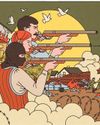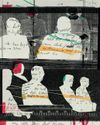
McCullers was a brilliant but pampered writer, one who never quite grew up.
Throughout her life, the novelist Carson McCullers struck observers as preternaturally young. The biographer Leon Edel, who met her when she was thirty-seven, remarked on her "childish wonder."The French novelist Françoise Sagan wrote that she had the “laugh of a child forever lost." Like a child, she loved sweets, Christmas, and receiving presents on her birthday. Though she was tall a "slender wand of a girl," in the words of her protégé turned rival, Truman Capote-she was often described as "little": "an odd little 22-year old," a "little star."
If seemingly everyone agreed that McCullers was a child, they indulged her because she was a genius. The author of four novels, one novella, two plays, and sundry short stories and poems, McCullers ascended to literary fame when she was only twenty-three. Her début novel, "The Heart Is a Lonely Hunter," wowed critics, who crowned her Faulkner's successor. In the decades that followed, McCullers devoted herself entirely to her work, relying on alcohol and an active fantasy life for inspiration. She relied, too, on a rotating cast of friends and family members, who cooked her meals, poured her drinks, listened to "her self-loving arias," and tucked her into bed at night. The playwright Tennessee Williams, McCullers's closest friend, thought she could be demanding, but he also thought that "when you remember the poetry of her work, you feel differently about her, appreciate her isolation and her longings, and you forgive her selfishness."
This story is from the March 04, 2024 edition of The New Yorker.
Start your 7-day Magzter GOLD free trial to access thousands of curated premium stories, and 9,000+ magazines and newspapers.
Already a subscriber ? Sign In
This story is from the March 04, 2024 edition of The New Yorker.
Start your 7-day Magzter GOLD free trial to access thousands of curated premium stories, and 9,000+ magazines and newspapers.
Already a subscriber? Sign In

GET IT TOGETHER
In the beginning was the mob, and the mob was bad. In Gibbon’s 1776 “Decline and Fall of the Roman Empire,” the Roman mob makes regular appearances, usually at the instigation of a demagogue, loudly demanding to be placated with free food and entertainment (“bread and circuses”), and, though they don’t get to rule, they sometimes get to choose who will.

GAINING CONTROL
The frenemies who fought to bring contraception to this country.

REBELS WITH A CAUSE
In the new FX/Hulu series “Say Nothing,” life as an armed revolutionary during the Troubles has—at least at first—an air of glamour.

AGAINST THE CURRENT
\"Give Me Carmelita Tropicana!,\" at Soho Rep, and \"Gatz,\" at the Public.

METAMORPHOSIS
The director Marielle Heller explores the feral side of child rearing.

THE BIG SPIN
A district attorney's office investigates how its prosecutors picked death-penalty juries.

THIS ELECTION JUST PROVES WHAT I ALREADY BELIEVED
I hate to say I told you so, but here we are. Kamala Harris’s loss will go down in history as a catastrophe that could have easily been avoided if more people had thought whatever I happen to think.

HOLD YOUR TONGUE
Can the world's most populous country protect its languages?

A LONG WAY HOME
Ordinarily, I hate staying at someone's house, but when Hugh and I visited his friend Mary in Maine we had no other choice.

YULE RULES
“Christmas Eve in Miller’s Point.”